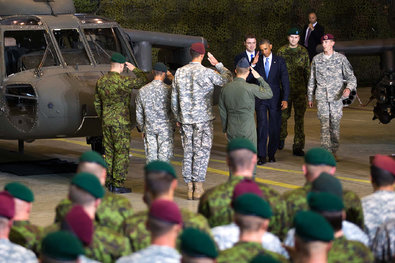
Is Trump’s Foreign Policy Really That Unreasonable?
Republicans and Democrats have condemned Donald J. Trump for seeming to abandon U.S. treaty commitments to our allies in an interview last week with The New York Times. He also said the United States was in no position to lecture others about human rights and questioned the widespread deployment of U.S. troops. But are his positions that much out of line with those espoused by others who are not considered extremists?
* condemn = 규탄[비난]하다/ abandon = (지지・믿음을) 버리다[포기하다]/ treaty = 조약/ commitment = 약속; 전념; 헌신/ ally(pl. allies) = 동맹국/ lecture = 잔소리[설교]를 하다/ human rights = (기본적) 인권/ question = 의심하다, 의문을 갖다; 이의를 제기하다; (특히 공식적으로) 질문하다, 심문하다, 설문 조사하다/ widespread deployment = 광범위한 (군대, 무기) 배치/ be out of line with ~ = ~와 일치하지 않다/ espouse = (주의・정책 등을) 옹호[지지]하다/ extremist = 극단[과격]주의자
 Donald Trump의 외교 정책은 극단 주의자가 아닌 이들의 지지를 받는 사람들과 크게 차이가 나나요?
Donald Trump의 외교 정책은 극단 주의자가 아닌 이들의 지지를 받는 사람들과 크게 차이가 나나요?
1. Liberals May Have More in Common With Trump Than They Realize
A President Trump might represent a degree of continuity with Obama, and Cold War doves,
that the hawkish Clinton would not.
2. We Are Flawed Messengers
Since the Cold War, U.S. elites have been indifferent to how police brutality plays abroad.
And who would die to defend Baltic states? -- the poor, and minorities.
3. Our Alliances and Treaties Are in Our Interests
With allies defraying costs, it's cheaper to have, and easier to deploy, troops overseas.
And it’s in no one’s interest to see small states chewed up.
Sample Essay
Liberals May Have More in Common With Trump Than They Realize
Donald Trump’s observations about the cost and durability of America’s alliances in Europe and Asia are provoking a chorus of indignation. On the right, Senator Mitch McConnell said that they represented a “rookie mistake.” On the left, Hillary Clinton's foreign policy adviser Jake Sullivan discerned an “obsequious fascination” on Trump’s part with President Vladimir Putin of Russia, while others deem Trump an outright agent of Moscow. But are Trump’s remarks really that outlandish? Or do they represent the return of an older debate about America’s purpose?
During much of the Cold War, liberal foreign policy makers often engaged in fierce battles with the right over the extent of American commitments to other nations and what they meant for its finances. Their thinking was deeply influenced by Walter Lippmann, the dean of the foreign policy establishment, who had shifted from Wilsonian idealism to stating that Washington’s mission “consists in bringing into balance, with a comfortable surplus of power in reserve, the nation's commitments and the nation's power."
The former diplomat George F. Kennan thus opposed the creation of NATO and created a furor in 1957 when he delivered a series of lectures on the BBC urging the withdrawal of American troops from Europe to create a neutral and united Germany. How different is this from Trump’s musing about leaving South Korea?
Next, in the 1980s, figures such as Senator J. William Fulbright warned about the costs of empire and a “solvency school” that included liberals such as Kennan and the historian Paul Kennedy drew on Lippmann’s arguments to maintain that the Reagan administration was too interventionist and that it was high time to retrench. Sound familiar?
None of this answers the question of what the proper balance is for America, a global power if there ever was one, in 2016 and beyond. Trump’s proposed solutions may be none at all. But surely Trump deserves something other than public obloquy for prompting a fresh debate. There’s nothing inherently illegitimate about reassessing American power and finances, nor, for that matter, in reminding our allies that America can’t simply write a blank check to underwrite their security, as agreeable as they may find that state of affairs.
Someone who has expressed similar views, incidentally, is President Obama. Obama has bemoaned NATO “free riders” who rely on America to pay for their security. Obama has also refused to intervene in Syria and to send lethal weapons to Ukraine. A President Trump might even represent a degree of continuity with Obama that the hawkish Hillary Clinton would decidedly not. They may abhor the thought, but liberals likely have more in common with Trump than they realize.





![]() Donald Trump의 외교 정책은 극단 주의자가 아닌 이들의 지지를 받는 사람들과 크게 차이가 나나요?
Donald Trump의 외교 정책은 극단 주의자가 아닌 이들의 지지를 받는 사람들과 크게 차이가 나나요?






